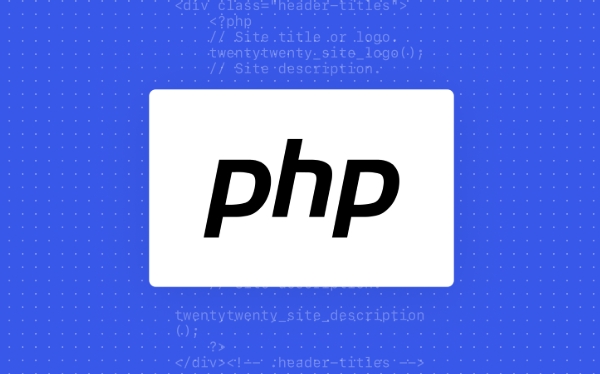使用PHP参考来掌握现场阵列更新
使用PHP引用可实现数组的原地更新,避免复制开销并提升性能。1. 使用&操作符创建引用,使变量指向同一数据,修改即反映到原数组;2. 处理嵌套数组时,通过&获取深层元素引用,直接修改而无需重新赋值;3. 在foreach循环中使用&$item可修改原数组元素,但循环后必须unset($item)以防止后续副作用;4. 可编写函数通过动态路径返回深层引用,适用于配置管理等场景;5. 引用虽高效,但应谨慎使用,避免过度复杂化代码,确保逻辑清晰且必要时添加注释。正确使用引用能显著优化大型或嵌套数组的操作效率。

When working with arrays in PHP, especially large or nested ones, performance and memory efficiency matter. One powerful technique for optimizing array operations—particularly updates—is using PHP references to perform in-place modifications. This approach avoids unnecessary copying and ensures changes are applied directly to the original data structure.

Here’s how to master in-place array updates using PHP references.
Understanding PHP References
In PHP, variables are assigned by value by default. That means when you assign an array to another variable, PHP creates a copy:

$a = [1, 2, 3]; $b = $a; // $b is a copy of $a $b[] = 4; // Modifying $b doesn't affect $a
But with references (using the & operator), both variables point to the same data:
$a = [1, 2, 3];
$b = &$a; // $b is a reference to $a
$b[] = 4; // Now $a also reflects this change
echo implode(', ', $a); // Output: 1, 2, 3, 4This behavior is essential for in-place updates, especially when dealing with nested arrays or iterative processing.

Updating Nested Arrays In Place
A common challenge is modifying deeply nested arrays without creating intermediate copies. Using references allows you to traverse and update structures directly.
Example: Updating a nested configuration
$config = [
'database' => [
'host' => 'localhost',
'credentials' => [
'username' => 'root',
'password' => 'pass'
]
]
];
// Get a reference to the nested value
$ref = &$config['database']['credentials'];
$ref['password'] = 'new_secure_pass';
// No need to reassign — change is in-place
echo $config['database']['credentials']['password']; // Output: new_secure_passWithout the &, you’d be working on a copy, and your changes wouldn’t persist in the original array.
Using References in Loops for In-Place Updates
When iterating over arrays to modify their elements, using references prevents working on copies.
Common mistake (no reference):
$items = [1, 2, 3];
foreach ($items as $item) {
$item *= 2; // This modifies a copy, not the original
}
// $items is still [1, 2, 3]Correct approach with reference:
$items = [1, 2, 3];
foreach ($items as &$item) {
$item *= 2;
}
// $items is now [2, 4, 6]The &$item ensures each element is accessed by reference, so updates affect the original array.
Important: Always unset the reference after the loop if you plan to reuse the variable, to avoid unexpected behavior:
foreach ($items as &$item) {
$item *= 2;
}
unset($item); // Break the reference to avoid side effectsIf you don’t unset it, a subsequent loop might accidentally overwrite the last element.
Building Dynamic Paths with References
For complex nested arrays, you can write a reusable function to reach and update a value at a dynamic path using references.
function &getDeepReference(&$array, $path) {
$current = &$array;
foreach ($path as $key) {
$current = &$current[$key];
}
return $current;
}
// Usage
$data = ['user' => ['profile' => ['name' => 'Alice']]];
$target = &getDeepReference($data, ['user', 'profile', 'name']);
$target = 'Bob';
echo $data['user']['profile']['name']; // Output: BobThis pattern is useful in configuration managers, form processors, or tree structures where paths are determined at runtime.
Key Points to Remember
- Use
&to create references and enable in-place updates. - References avoid memory overhead from copying large arrays.
- In
foreach, use&$valueto modify original elements. - Always
unset(&$ref)after a referenced loop to prevent bugs. - Be cautious: references can make code harder to debug if overused or unclear.
In-place updates with PHP references are a subtle but powerful tool. When used appropriately—especially in nested structures or performance-sensitive loops—they make your code more efficient and your intent clearer. Just remember: with great power comes great responsibility. Use references thoughtfully, document them when needed, and avoid them when value semantics are safer.
Basically, if you're modifying arrays deeply or repeatedly, references can help you do it right—without the bloat.
以上是使用PHP参考来掌握现场阵列更新的详细内容。更多信息请关注PHP中文网其他相关文章!

热AI工具

Undress AI Tool
免费脱衣服图片

Undresser.AI Undress
人工智能驱动的应用程序,用于创建逼真的裸体照片

AI Clothes Remover
用于从照片中去除衣服的在线人工智能工具。

Clothoff.io
AI脱衣机

Video Face Swap
使用我们完全免费的人工智能换脸工具轻松在任何视频中换脸!

热门文章

热工具

记事本++7.3.1
好用且免费的代码编辑器

SublimeText3汉化版
中文版,非常好用

禅工作室 13.0.1
功能强大的PHP集成开发环境

Dreamweaver CS6
视觉化网页开发工具

SublimeText3 Mac版
神级代码编辑软件(SublimeText3)
 根据来自另一个数组的值更新PHP数组
Aug 02, 2025 am 12:51 AM
根据来自另一个数组的值更新PHP数组
Aug 02, 2025 am 12:51 AM
使用array_merge()可以简单地用第二个数组的值覆盖更新原数组;2.使用联合运算符( )能保留原数组值,仅添加缺失的键(适合设置默认值);3.通过foreach结合条件判断可实现细粒度控制,如仅更新非空值;4.对于嵌套数组,应使用array_replace_recursive()实现深度更新;5.更新时应始终用array_key_exists()或isset()安全检查键的存在性以避免错误;这些方法覆盖了PHP中基于另一数组更新数组的主要场景,并应根据数据结构和逻辑选择合适方式,确保操作
 深入研究' array_walk”,以进行复杂的数组变换
Aug 02, 2025 pm 03:28 PM
深入研究' array_walk”,以进行复杂的数组变换
Aug 02, 2025 pm 03:28 PM
array_walk是PHP中用于就地修改数组元素的强大函数,适用于需基于键名、嵌套结构或外部状态进行复杂转换的场景。1.它通过引用传递数组和元素,直接修改原数组;2.回调函数可访问键和值,并支持第三个参数传递上下文;3.可结合递归处理多维数组;4.适合批量修改对象属性;5.不返回新数组,性能优于array_map但不适用于需保留原数组的场景。正确使用时,它在处理上下文相关或递归数据转换中表现高效且代码简洁。
 用于更新多维PHP阵列的高级技术
Aug 03, 2025 am 06:26 AM
用于更新多维PHP阵列的高级技术
Aug 03, 2025 am 06:26 AM
Userecursivefunctionstosafelytraverseandupdatenestedarrayswithunknowndepthbycreatingmissingkeysasneeded.2.Leveragearrayreferenceswiththe&operatortodirectlymodifyoriginalarrayelementswithouttriggeringcostlycopiesduringdeeptraversal.3.Implementdotn
 优化大型数组更新操作以进行内存和速度
Aug 02, 2025 am 02:08 AM
优化大型数组更新操作以进行内存和速度
Aug 02, 2025 am 02:08 AM
TOOPTIMIZELARGE-SCALARAYUPDATES:1.MutatearRaysInplaceInsteadOfCrowingCopiesusIsesspreadorConcattoreCattoredUceMoryUsage; 2.BatchupDateStomInimizeFunctionCalloverhead,pre-AllocateArrayseSizeisknown,sizeIskNown,and ChunkunkunkllargeInsertionStocallStoElstoelstoelstoelstoelstoelstoionclinclimstoelstoelstoelstoelstoelstoelstoelstoelstoelstoelstoelstoelstoelstoelstoelstoelstoelstoidclim;
 动态阵列修改:即时添加或更新元素
Aug 02, 2025 pm 03:37 PM
动态阵列修改:即时添加或更新元素
Aug 02, 2025 pm 03:37 PM
DynamicArraysallaySallayRuntimemodification byaddingorupdatingelements,withBestPracticesSistrictersing效率和安全性。1)usepush/appendToAddelements.2 theEndforoptimalperformance.2)避免使用nunshift/insertormiddleInsertions whenperions whenperions whenphenpersions whenpossions,astheyrequireshiftingelementsa
 使用功能性php的不变阵列更新的艺术
Aug 05, 2025 pm 12:30 PM
使用功能性php的不变阵列更新的艺术
Aug 05, 2025 pm 12:30 PM
要实现PHP中的不可变数组更新,必须通过创建新数组而非修改原数组来完成,1.避免直接修改数组元素,应使用array_merge()或手动复制生成新数组;2.使用array_merge()进行简洁的不可变更新,保持原数组不变并支持添加新键;3.对嵌套数组使用纯函数如递归setIn()函数,确保深层结构更新时不产生副作用;4.结合array_map、array_filter等函数式工具,实现无副作用的数据处理;5.通过约定强化不可变性,如将输入数组视为只读、返回新数组、使用PHP8.2 的reado
 修改PHP中对象阵列的指南
Aug 04, 2025 am 12:38 AM
修改PHP中对象阵列的指南
Aug 04, 2025 am 12:38 AM
ArraySofObjectsInphpContainClassInstances,允许基于directPropertyormethod的模块化; 2.UpdatePropertiesusingforeachloopssincebopssincebopssincebopssobjectsarepassedbyByReference,oruestertersterstersforencapsualderpalpulyproperties; 3.filterobjectswitharray_filteraray_filteraray_filterterterterterterterterterterterterterterterterterterterterterteSeSetsubSetsBase
 使用PHP参考来掌握现场阵列更新
Aug 05, 2025 pm 04:46 PM
使用PHP参考来掌握现场阵列更新
Aug 05, 2025 pm 04:46 PM
使用PHP引用可实现数组的原地更新,避免复制开销并提升性能。 1.使用&操作符创建引用,使变量指向同一数据,修改即反映到原数组;2.处理嵌套数组时,通过&获取深层元素引用,直接修改而无需重新赋值;3.在foreach循环中使用&$item可修改原数组元素,但循环后必须unset($item)以防止后续副作用;4.可编写函数通过动态路径返回深层引用,适用于配置管理等场景;5.引用虽高效,但应谨慎使用,避免过度复杂化代码,确保逻辑清晰且必要时添加注释。正确使用引用能显着优化大型







